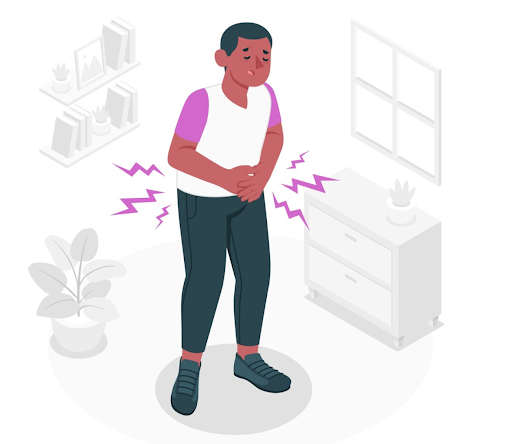Have you been struggling with digestive issues? If your answer is a solid ‘yes’ or maybe you’re unsure, that’s ok because we’re here to answer all your digestion-related questions. Whether you’re wondering what the symptoms are or searching for ways to improve your digestion, you’ve come to the right place.
Without further ado, let’s dive right in!
Poor Digestion - What Is It & How Does One Get It?
Poor digestion occurs when the body has difficulty breaking down food, making it hard for the body to absorb nutrients. This can be caused by various factors, from diet to viruses. Certain lifestyle choices, such as getting distracted or stressed while eating, can also contribute to poor digestion.
Poor digestion can be linked to your gut health. How? Well, your gut is responsible for digesting and absorbing food nutrients with the help of bacteria. Furthermore, a healthy gut has a balance of ‘good’ and ‘bad’ bacteria where the good bacteria outnumber the bad bacteria. An imbalance in the types and levels of bacteria can be triggered by certain things which lead to digestive troubles. Therefore, poor digestion can indicate poor gut health.
6 Symptoms of Poor Digestion
There are different symptoms that you might experience if you have poor digestion. These include:
Digestive Symptoms:
Some of the digestive symptoms that you might experience are gas, bloating, diarrhea, constipation, and heartburn. A balanced gut will face fewer problems in processing food and getting rid of waste, which means fewer symptoms.
Weight Changes
Weight gain or loss can occur without making any changes to your diet or physical activities. An imbalanced gut can make it hard for your body to absorb the nutrients it requires. Weight gain may be a result of increased inflammation or insulin resistance, while weight loss may be due to malabsorption caused by small intestinal bacterial overgrowth (SIBO).
Skin Conditions
Lower levels of bacteria that are beneficial to your body may impact your immune system and also the health of your skin. This can cause skin conditions like psoriasis which may be related to the bacteria present in the gut. Other skin conditions you may start to notice include acne, rashes, and irritations.
Sleep Problems
Research shows that an imbalance in gut bacteria may result in disturbed sleep, leading to chronic fatigue. This seems to be connected to metabolic function, inflammation, and mental health.
High Stress Levels
The brain and the gut are connected and this connection is bidirectional, meaning digestive issues can cause stress and vice versa. Poor digestion can change your overall mental state, causing low mood, anxiety, and high stress.
Development of Diseases
A poor gut can change the normal functions of the immune system. This may lead to the development of autoimmune diseases, where the body mistakes its cells and organs to be dangerous and attacks itself. This can leave your body susceptible to infectious illnesses.
How to Improve Your Gut Health & Aid Digestion
Are you wondering how to improve your digestion and overall gut health? Here are some ways you can achieve that.
-
Improve Your Diet:
There are certain types of food you need to cut from, reduce, or increase in your diet. Consume more plant foods like beans, nuts, grapes, whole grains, cherries, and crunchy bell peppers. Eat fermented foods such as yoghurt, kimchi, and miso. Reduce your consumption of fructose which is found in fruits like pears, apples, and mango. Rather opt for citrus fruits and berries which are lower in fructose, or bananas which contain inulin and are rich in fibre. Reduce your consumption of processed foods, high-fat foods, and sugar.
-
Drink Water:
We know this is simple but we can’t help but reiterate it. Staying hydrated helps with a lot of health-related issues, including getting rid of toxins and waste from the body as well as flushing bacteria from your bladder. So, be sure you have the required amount of water per day.
-
Get Enough Sleep
While certain people may sleep for 7-8 hours and feel well-rested, others may not. The quality of your sleep is just as important as the quantity of your sleep. So, figure out the pre-bedtime routine that will improve the quality of your sleep and stick to it. You can also include our sleep gummies in your routine to improve the quality of your sleep.
-
Eat Unhurriedly:
Take your time to eat your food as it may help maintain your gut health and reduce digestive discomfort. Thoroughly chewing your food before swallowing can reduce the chances of developing diabetes and obesity.
-
Manage Stress:
Stress can lead to numerous mental and physical health problems, which is why you must take the right measures to lower your stress levels. Some ways you can achieve that is by meditating, going on walks, spending time with your loved ones, doing the things that make you happy, getting regular massages, etc. Quit or avoid smoking and limit your alcohol intake.
-
Probiotics:
These are supplements that improve the good bacteria that aid in digestion and improve the overall gut health. It comes in forms like tablets and powders that you can consume in your preferred way. Our probiotics come in delicious, flavoured gummies that you can easily pop in your mouth and let it work its magic.
In case you're experiencing chronic digestive problems, we highly recommend you seek medical advice from a professional.
References
https://www.healthline.com/health/gut-health#signs-of-an-unhealthy-gut
https://www.betterhealth.vic.gov.au/health/healthyliving/gut-health
https://www.webmd.com/digestive-disorders/digestive-health-tips
































